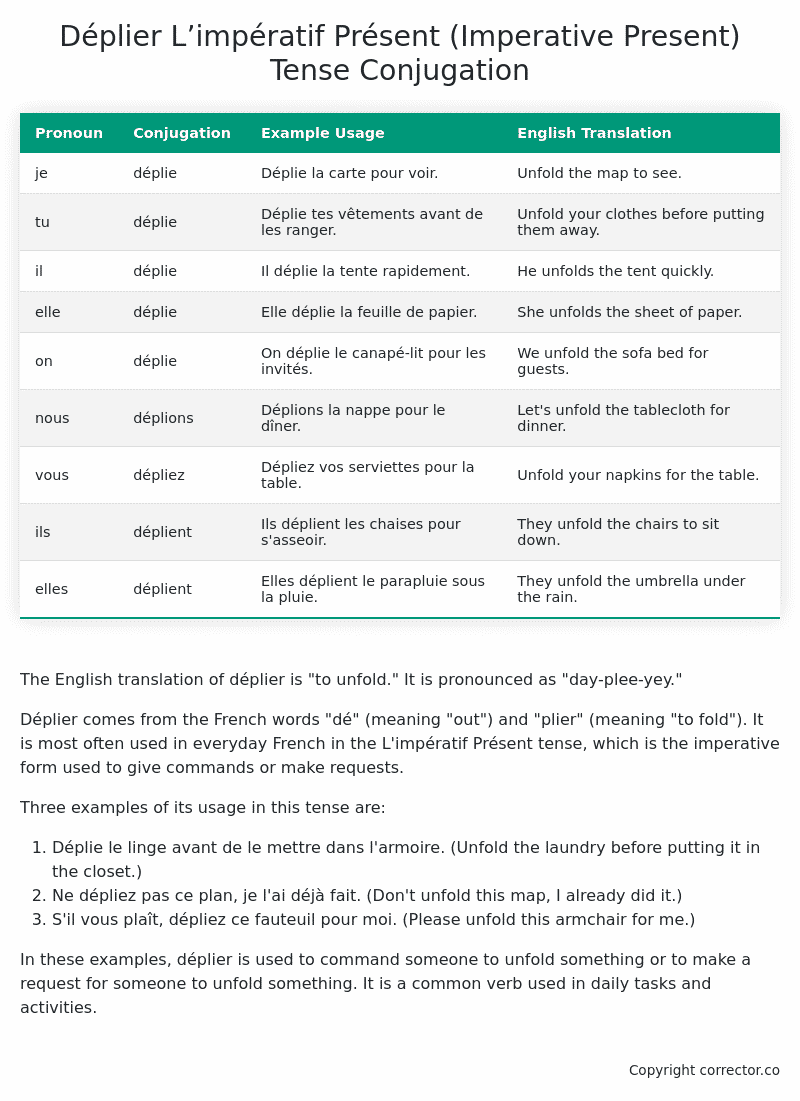L’impératif Présent (Imperative Present) Tense Conjugation of the French Verb déplier
Introduction to the verb déplier
The English translation of déplier is “to unfold.” It is pronounced as “day-plee-yey.”
Déplier comes from the French words “dé” (meaning “out”) and “plier” (meaning “to fold”). It is most often used in everyday French in the L’impératif Présent tense, which is the imperative form used to give commands or make requests.
Three examples of its usage in this tense are:
- Déplie le linge avant de le mettre dans l’armoire. (Unfold the laundry before putting it in the closet.)
- Ne dépliez pas ce plan, je l’ai déjà fait. (Don’t unfold this map, I already did it.)
- S’il vous plaît, dépliez ce fauteuil pour moi. (Please unfold this armchair for me.)
In these examples, déplier is used to command someone to unfold something or to make a request for someone to unfold something. It is a common verb used in daily tasks and activities.
Table of the L’impératif Présent (Imperative Present) Tense Conjugation of déplier
| Pronoun | Conjugation | Example Usage | English Translation |
|---|---|---|---|
| je | déplie | Déplie la carte pour voir. | Unfold the map to see. |
| tu | déplie | Déplie tes vêtements avant de les ranger. | Unfold your clothes before putting them away. |
| il | déplie | Il déplie la tente rapidement. | He unfolds the tent quickly. |
| elle | déplie | Elle déplie la feuille de papier. | She unfolds the sheet of paper. |
| on | déplie | On déplie le canapé-lit pour les invités. | We unfold the sofa bed for guests. |
| nous | déplions | Déplions la nappe pour le dîner. | Let’s unfold the tablecloth for dinner. |
| vous | dépliez | Dépliez vos serviettes pour la table. | Unfold your napkins for the table. |
| ils | déplient | Ils déplient les chaises pour s’asseoir. | They unfold the chairs to sit down. |
| elles | déplient | Elles déplient le parapluie sous la pluie. | They unfold the umbrella under the rain. |
Other Conjugations for Déplier.
Le Present (Present Tense) Conjugation of the French Verb déplier
Imparfait (Imperfect) Tense Conjugation of the French Verb déplier
Passé Simple (Simple Past) Tense Conjugation of the French Verb déplier
Passé Composé (Present Perfect) Tense Conjugation of the French Verb déplier
Futur Simple (Simple Future) Tense Conjugation of the French Verb déplier
Futur Proche (Near Future) Tense Conjugation of the French Verb déplier
Plus-que-parfait (Pluperfect) Tense Conjugation of the French Verb déplier
Passé Antérieur (Past Anterior) Tense Conjugation of the French Verb déplier
Futur Antérieur (Future Anterior) Tense Conjugation of the French Verb déplier
Subjonctif Présent (Subjunctive Present) Tense Conjugation of the French Verb déplier
Subjonctif Passé (Subjunctive Past) Tense Conjugation of the French Verb déplier
Subjonctif Imparfait (Subjunctive Imperfect) Tense Conjugation of the French Verb déplier
Subjonctif Plus-que-parfait (Subjunctive Pluperfect) Tense Conjugation of the French Verb déplier
Conditionnel Présent (Conditional Present) Tense Conjugation of the French Verb déplier
Conditionnel Passé (Conditional Past) Tense Conjugation of the French Verb déplier
L’impératif Présent (Imperative Present) Tense Conjugation of the French Verb déplier (this article)
L’infinitif Présent (Infinitive Present) Tense Conjugation of the French Verb déplier
Struggling with French verbs or the language in general? Why not use our free French Grammar Checker – no registration required!
Get a FREE Download Study Sheet of this Conjugation 🔥
Simply right click the image below, click “save image” and get your free reference for the déplier L’impératif Présent tense conjugation!

Déplier – About the French L’impératif Présent (Imperative Present) Tense
Usage
Giving commands
Making requests
Offering advice
Expressing desires
Conjugation Formation
Interactions with other tenses
Want More?
I hope you enjoyed this article on the verb déplier. Still in a learning mood? Check out another TOTALLY random French verb conjugation!


